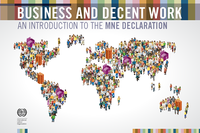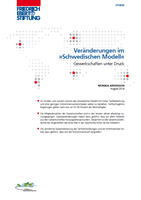 |
|
Welcome to issue no. 4 / 2014 of EWC News. 27 December 2014
|
|
The
Academy for European Works Councils (EWC Academy)
EWC
News appears four times a year.
You can find past issues in the newsletter archives.
|
|
1.
Will
codetermination become the EU standard?
|
|
European trade unions make historical decision
In the past differing opinions within the trade union movement are to be explained by the very different historical experience with employee participation in Corporate Governance. While this is common in Scandinavia even in small companies (Sweden starting with 25 employees, Norway with 30, Denmark with 35, Finland with 150) and extensive regulations exist in others (one-third participation in Austria starting with 300 employees, in Germany with 500, in Luxembourg with 1,000, and parity-based supervisory board in Germany starting with 2,000 employees), there are a number of West European countries with no practical experience at all in the matter. This applies in particular to Italy, Spain, Belgium and the United Kingdom. Participation on the supervisory board in countries such as Hungary, Slovenia, Czechia and Slovakia is based on the Austrian model. On the other hand Poland and Romania have taken another path – and are usually completely without participation.
European Company Directive (SE) While the SE Directive puts German codetermination under some pressure, other countries are experiencing an increase in participation possibilities. Employee representatives from Italy, England, Belgium and Poland have now consequently found their way onto SE supervisory boards. In 2013, 120 employee representatives from Germany were members of a SE supervisory board and 36 employee representatives from 15 further countries. Although these are still quite modest figures, they lead to new, practical experience and discussions in countries where there was previously no knowledge of participation.
What is the European Trade Union Confederation (ETUC) demanding?
The situation in France and Great
Britain Forthcoming event
|
|
2.
Recent court rulings
|
|
Is downsizing a "confidential business secret"?
Even though these legal proceedings concern a national works council, the same question also arises for European works councils. What information is to be considered as confidential? What information can EWC members communicate to their local works councils? In how much detail and also how critically is it possible for European works councils to inform the workforce? There is currently a court case ongoing for the latter question before the Baden-Württemberg District labour court (see report in EWC News 3/2013). The EWC chairman of the Amcor packaging group, who filed the complaint, will give a presentation during the Hamburg EWC conference on 26 January 2015.
When does a matter have a transnational character?
The Transdev European works council was established in July 2012 following the merger with the transport division of Veolia Environnement (see report in EWC News 4/2012). The EWC agreement fully integrates the new EU Directive standards and in some aspects even goes beyond. The transnational competence of the EWC has been extended by including the so-called recital 16, word-for-word from the Directive’s preamble. As a result the EWC is also responsible for matters which concern only one country, but whose consequences are relevant to all European employees (see report in EWC News 1/2013). The filing to the Nanterre District Court expressly referred to this point.
The judges did not however acknowledge any transnational nature. The entire SNCM workforce is employed in France and the SNCM and Transdev managements are also located in France. There are therefore not two countries involved. Since SNCM represents only 2.5% of Transdev’s entire workforce there are no consequences for the whole of the group with any relevance for European employees. There is furthermore no transfer of undertakings to other countries to be expected. As a consequence only the French work councils are to be informed and consulted, but not the European works council. Following texts are available only in French:
A legal seminar on previous EWC case-law is being held from 28 to 30 October 2015 in Hamburg.
|
|
3.
Collective bargaining – unified by law
|
|
German government wants to safeguard the functioning of collective bargaining
In the decades following Second World War such legislation was not necessary. Firstly, in the private sector, the German trade union confederation DGB hardly had any serious competitor and secondly, the courts supported unified collective bargaining in their decisions. In June 2010, the Federal Labour Court put an end to this long lasting principle in a groundbreaking ruling in complete opposition to the norm in Europe. In contrast, only one month before, French supreme court "Cour de Cassation" ruled exactly the opposite and reinforced bargaining unity in France (see report in EWC News 2/2010). There was neither a breach of European laws nor of any ILO conventions. Furthermore, this ruling is particularly remarkable, since France, like many other Southern European countries, has a long standing experience with trade-union plurality and its inherent problems.
Legislation on unified collective bargaining wide-spread in countries with union plurality
The most extensive reform of legislation on collective bargaining since the Second World War came into force in France on 1 January 2009 (see report in EWC News 4/2008). Following the Spanish model, the legislator has fixed thresholds for collective bargaining recognition, which are calculated from the works council election results. Unions, which obtain less than 10% of the votes, can no longer conclude shop floor agreements. For such an agreement to be valid, the signing unions must together totalize at least 30% of the votes. Hereby union membership levels are of no consequence. A trend towards bargaining alliances is to be observed since 2009, since otherwise small unions would risk losing their rights (see the SNCF and France Télécom examples in EWC News 1/2010).
Similar regulations have existed in Spain already for many years and have led the competing trade unions to co-operate constructively in collective bargaining. In Spain all collective agreements are actually signed together by the CC.OO. and UGT and small organizations are hardly present at all in collective bargaining. In Italy, the recognition for collective bargaining of competing trade unions was also reformed in January 2014, as a consequence of a previous ruling of the constitutional court in Rome (see report in EWC News 2/2014).
There are also precise regulations on recognition for collective bargaining in many other countries. Frequently criteria are also defined for when a shop floor agreement is valid or not. The following are some examples:
Does German collective bargaining legislation conform to the constitution and to the EU?
If one regards the European landscape, then the planned German legislation falls in line with the regulations of many other EU countries. However should the legislation not conform (as in Czechia) to the constitution or even to EU regulations, this would in turn affect numerous countries. This was possibly one of the reasons why the legal battle around the French collective agreement legislation did not go as far as the European Court of Justice in Luxembourg. The European Court of Justice for human rights in Strasbourg also plays a role on the subject. In April 2014 it had to make decisions on restrictions to the right to strike in Britain dating from the Thatcher times. The judges accorded a certain discretion to the legislator for implementing the human right to strike and rejected the complaint filed by the RMT trade union (see report in EWC News 2/2014).
The recognition arrangements of French trade unions is on the agenda of a seminar being held from 14 to 16 September 2015 in Paris (with simultaneous interpretation).
|
|
4. Newly established
European work councils
|
|
EWC for world’s
market leader in meal vouchers
It is composed of 13 representatives from 13 countries. As usual in France, it is chaired by the employer. Plenary meetings are held once annually. The select committee made up of four employee representatives and one representative from central management, meets once per year by video or teleconference in order to prepare the plenary meeting. Meetings requested by the employee side in exceptional circumstances are also only held virtually. It remains to be seen whether the new EU standards for the consultation procedure, which fully apply to Edenred, can be put into practice by these means. EWC members have in addition a right to training (see report in EWC News 2/2012).
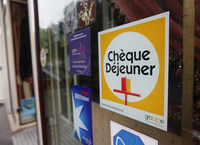  Cooperative establishes EWC Cooperative establishes EWCThe third largest meal voucher supplier, the French cooperative Chèque Déjeuner, also signed a EWC agreement at the company headquarters in the Paris suburb, Gennevilliers, on 4 November 2014. In contrast with Edenred this is a company which belongs to its 2,000 employees. Furthermore they elect the board of directors (14 members) and receive profit sharing. The works council also elects an additional three members to the board of directors. Chèque Déjeuner is present in 13 countries, including ten EU member states. The European works council will hold one plenary meeting per year at the company headquarters and a further meeting in another country. The select committee meets twice annually, with a preference on video conferencing as opposed to physical meetings. The EWC can create its own working groups. Central management bears all costs, but in addition the EWC has its own annual budget of 5,000 €. Each EWC member has a right to 90 hours time-off and the secretary to 120 hours (in addition to time for meetings). Each EWC member has a right to ten days training per term of office and is free to choose which training and which provider is appropriate. Altogether the total training budget for a four-year term of office amounts to 120,000 € (excluding language courses). The EWC agreement makes extensive provisions for experts, which is usual in France (see report in EWC News 1/2008). Largest Swedish office furniture manufacturer establishes EWC   On
19 November 2014 a EWC agreement was signed at the Kinnarps
headquarters in Western Götaland. This family business with
2,500
employees, half of which are outside Sweden, has production sites in
Sweden and Germany as well as subsidiaries in almost all European
countries. The EWC meets once per year at the company’s
headquarters, with a further meeting possible at a foreign site. A
steering committee is established with up to five members that
carry out their duties on a permanent basis and develop a training
curriculum for EWC members. The consultation procedure is based on the
new Swedish EWC legislation, which was not however incorporated
word-for-word. Kinnarps is well-known for its high standards of
Corporate Social Responsibility (CSR) and its commitment to
environmental activities. As usual in Sweden, the EWC agreement is
formulated very much on the basis of a social partnership. On
19 November 2014 a EWC agreement was signed at the Kinnarps
headquarters in Western Götaland. This family business with
2,500
employees, half of which are outside Sweden, has production sites in
Sweden and Germany as well as subsidiaries in almost all European
countries. The EWC meets once per year at the company’s
headquarters, with a further meeting possible at a foreign site. A
steering committee is established with up to five members that
carry out their duties on a permanent basis and develop a training
curriculum for EWC members. The consultation procedure is based on the
new Swedish EWC legislation, which was not however incorporated
word-for-word. Kinnarps is well-known for its high standards of
Corporate Social Responsibility (CSR) and its commitment to
environmental activities. As usual in Sweden, the EWC agreement is
formulated very much on the basis of a social partnership. |
|
5. Updated EWC
agreements
|
  Belgian chemicals group renews
EWC agreement Belgian chemicals group renews
EWC agreementSolvay’s EWC agreement was updated on 12 June 2014 in Brussels. Although the EWC was already established on the basis of a “voluntary” agreement in 1995, it is now fully subject to the provisions of the Belgian transposition of the new EU Directive (see report in EWC News 1/2011). There are extensive provisions on the transnational competence however in contrast with the Belgian EWC legislation, the employer is chairman. The EWC is composed of 21 delegates from nine countries, who meet once per year. They elect a four-member steering committee, which can hold its monthly meetings in any European site and meet with local employee representatives. In exceptional circumstances the whole EWC holds a meeting not just the steering committee. As a consequence of the acquisition of Rhodia, the French chemicals group, in 2011, today more than half of the European workforce is in France; the second largest country is Germany, followed by Italy, and only in fourth place Belgium. Rhodia had its own European works council from 2001 to 2011 and from 2010 established an International Health and Safety Committee (see report in EWC News 3/2011). Solvay’s EWC had negotiated a charter on sustainable development in 2008 with central management (see report in EWC News 4/2008). French beverage group off to a new start   The
European works council of Pernod Ricard held a constitutional meeting
from 25 to 27 November 2014 for a new four-year term at the company
headquarters in Paris (photo). The EWC Academy delivered training on
this occasion. The EWC, first established in 1999, is now subject to
the new EU standards, which were integrated into their EWC agreement on
12 July 2014. The 24 members from 14 countries meet once per
year. The
European works council of Pernod Ricard held a constitutional meeting
from 25 to 27 November 2014 for a new four-year term at the company
headquarters in Paris (photo). The EWC Academy delivered training on
this occasion. The EWC, first established in 1999, is now subject to
the new EU standards, which were integrated into their EWC agreement on
12 July 2014. The 24 members from 14 countries meet once per
year. The employer is chairman. The five members of the steering committee come from five different countries and meet three times per year. As usual in French EWC agreements, there are detailed provisions for time-off. In addition to the time for meetings, normal representatives have a yearly allowance of 40 hours, members of the steering committee 60 hours and the secretary (= speaker of the employee side) 80 hours. The right to training amounts to three days per term-of-office. The wine and liquor producer has the largest workforce outside of France in the United Kingdom, where they acquired Chivas Brothers, the Whisky maker in 2001. Pernod Ricard signed an agreement on Corporate Social Responsibility in January 2014 (see report in EWC News 1/2014). 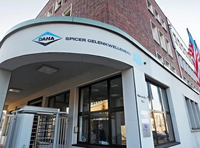  U.S. automobile supplier doubles
number of delegates U.S. automobile supplier doubles
number of delegatesStarting from 1 January 2015 a new EWC agreement enters into force for the Dana group. It is based on the new EU Directive’s standards, whereby the number of representatives could almost be doubled. The steering committee could also be enlarged from three to five members. The EWC established in 2000 has its headquarters in Essen, Germany (photo), where it normally holds its annual meeting. In the future a second plenary meeting can be held each year in another country. Central management has committed to inform the EWC as early as possible for enabling decision-changing discussions and consultation. Consultation has the goal of achieving "a mutually agreed solution as rapidly as possible". The new EWC agreement was concluded with the assistance of the EWC Academy and there was also a seminar on the subject in December 2012 (see report in EWC News 4/2012). We have arranged a selection of EWC agreement texts on a webpage for download. |
|
6. European
works councils following mergers
|
|
German automobile supplier merges two EWC bodies
Japanese electronics firm prefers British jurisdiction
In the process of integrating 24,000 Océ employees into the substantially larger Canon group, the European work councils also had to merge. They reached an agreement with central management and used the legal right to renegotiation for "changes in the structure of the undertaking", in order to secure itself the full legal status of the new EWC Directive (see report in EWC News 4/2011). The only concession to the employer was the change from Dutch to British jurisdiction, as often seen more recently (see report in EWC News 1/2012). The negotiations were conducted by both steering committees and started in December 2012 without the establishment of a Special Negotiating Body.
The two plenary meetings belong to the positive aspects of the new EWC agreement. Moreover the seven member select committee meets at least a further three times per year with management. Each year there is one day training for the entire EWC and additional training is possible. The transnational competence of the EWC goes beyond the specifications of the EU Directive. A fixed EWC budget is negotiated between the EWC and central management. On the critical side however is the fixed duration for the consultation procedure: it should not last longer than five weeks.
Forthcoming event
|
|
7.
Pan-European company agreements
|
|
Legal proceedings avoided at the last minute
The European works council only rendered its opinion once both companies had committed to an agreement closely resembling a pan-European company agreement. Negotiations on the matter had begun on 21 October 2014 under considerable time pressure and constant press coverage. Alstom was already experienced on the subject since the EWC had already negotiated a 3 year job-security agreement for all European sites in 2010, following the acquisition of Areva’s energy network (see report in EWC News 1/2010). The participation of a U.S. company in such negotiations was however a complete novelty.
Negotiating mandate for restructuring
The charter first describes the remaining proceedings for the information and consultation procedure up to the completion of the transaction on 30 June 2015. General Electric has formally committed to fulfill not only the legal obligations of the consultation procedure but also to "negotiate" alternatives to redundancies. Furthermore discussions will immediately begin on the future structure of Alstom’s European works council, which will be reduced in size and only cover railway engineering (including the TGV high-speed train manufacturing). A temporary EWC structure ("Structure de Représentation Temporaire") is to be established for up to three years for those divisions which are no longer under the control of Alstom. This body will receive a monthly report on the progress of the integration. Apart from the EU countries there are also representatives from Norway, Switzerland and Turkey. In the energy division a new working group is to be established between the EWC and the top management of both companies which will closely follow the forthcoming restructuring.
Forthcoming event
  EWC secures social framework for
IPO EWC secures social framework for
IPOOn 13 November 2014, Bayer’s European Forum, as the EWC of the chemicals group is named, signed a joint declaration with central management on the socially responsible spin-off of its plastics division with its 17,000 employees. The decision to list Bayer MaterialsScience (BMS) on the stock-market had been taken in September 2014. BMS would then be the fourth largest chemicals group in Europe. The long-standing social policy is to be continued in BMS. In all European sites restructuring is to be carried out according to the standards of the new EWC Directive. The relevant definition has been literally incorporated into the text of the declaration. There are “principles of social responsibility” that apply to any downsizing until 2020. This includes open and transparent information and consultation procedures with employee representatives on the local level in each individual country. Measures for securing jobs have priority and redundancy is to be considered only as a last resort. The Bayer EWC was already established in 1994, long before the adoption of the first EWC Directive.
  Quality
of life in the workplace Quality
of life in the workplaceA transnational agreement was signed on 27 November 2014 in Paris for the improvement of quality of life in the workplace for the French energy supplier GdF Suez. A Special Negotiating Body composed of 18 EWC members from nine countries was specifically established to negotiate the agreement in the course of four meetings with central management. Two European trade union federations are signatories. The agreement provides for an evaluation at the local level in all countries of the European Economic Area and based on a list of six criteria. Action plans are subsequently developed in collaboration with local employee representatives and are implemented according to a pre-determined three-step model. Transnational agreements of this kind are to be found more frequently in French-style companies e.g. in the energy group, Areva (see report in EWC News 3/2012) or in Lafarge, the building materials group (see report in EWC News 2/2013). |
|
8. Works Council Statistics
|
|
A first evaluation of these elections was published on 26 August 2014 by the Hans Böckler Foundation. Since the German Ministry of Labour has no official figures and no legal obligation to provide them, the evaluation represents the only data available. In contrast, in countries such as France or Spain an official evaluation of works council elections, provided by the government, is indispensable since it is the legal basis for granting collective bargaining rights or disqualifying small trade unions (see report in EWC News 2/2013).
Stable workforce representation
The average voter turnout of almost 80% continues to remain high and stable in German companies. Around two thirds of the elected representatives belong to a trade union within the German Trade Union Confederation (DGB), and about 25% are non-unionized. Therefore competing trade-union confederations do not play a significant role in terms of figures. The strong position of this one single confederation distinguishes Germany from many other countries, particularly in southern Europe.
The election results were particularly good for IG BCE, who won around 80% of all works council seats in the chemical and pharmaceuticals industries. They are closely followed by IG Metall with approximately 75%. In comparison the results for ver.di, the services trade-union, with 61% of all mandates are bad but still comparatively good on an international level. In Germany each of these trade unions has its particular industry-specific field of competence, and therefore they do not present candidates mutually against one another. In comparison with the last elections in 2010, the percentage figures have hardly changed. The following texts are only available in German: Works council resources in France
  On
12 November 2014, DARES, the research arm of the Ministry of Labour,
published the results of an analysis of French work councils. It shows
that there is a striking difference between unionized works council
bodies and those composed of non-union representatives. On
12 November 2014, DARES, the research arm of the Ministry of Labour,
published the results of an analysis of French work councils. It shows
that there is a striking difference between unionized works council
bodies and those composed of non-union representatives.The better working conditions and resources of unionized works councils is demonstrated by the following figures: almost half of these works councils (46%) make regular use of the assistance of experts, as opposed to only 18% in non-unionized works councils. 75% of unionized works councils dispose of their own offices in the company and only 48% in non-unionized councils. In unionized works councils 72% of all members have taken part in training, in comparison to 17% for non-unionized representatives. There are also major differences in the provisions for time-off work. Works council work in France significantly more difficult than in Germany French legislation does not make provisions for 100% time-off for individual mandate holders as in Germany but rather defines hourly allotments. In companies with more than 500 employees the study shows that 75% of all works council members have more than 35 hours per month time-off. As opposed to Germany, general assemblies of the workforce are not compulsory by law, but nevertheless take place in 60% of the companies investigated. A third of all works council members consider that their mandate hinders their professional development; as a consequence there is a lack of sufficient candidates in 38% of the companies analyzed. The work of the works councils is well appreciated by employees, although there is criticism on the little influence that the council has on the employer’s decisions. In every tenth French company the employer forbids the works council to communicate electronically with the workforce. Following texts are available only in French: Forthcoming event   A seminar on French industrial relations is being held from 14 to 16 September 2015 in Paris (with simultaneous interpretation). A visit to a French works councils’ trade fair is also planned. New figures on European works
councils
  On
2 December 2014, the European Trade Union Institute (ETUI) in Brussels
published a new statistical evaluation of European works councils. It
is based on the data from the Institute’s on-line database
that
it has been maintaining since 2005 with EWC agreement texts. At present
there are 1,070 European works councils in 987 companies. There are
currently negotiations underway for the establishment of a EWC in 56
companies. On
2 December 2014, the European Trade Union Institute (ETUI) in Brussels
published a new statistical evaluation of European works councils. It
is based on the data from the Institute’s on-line database
that
it has been maintaining since 2005 with EWC agreement texts. At present
there are 1,070 European works councils in 987 companies. There are
currently negotiations underway for the establishment of a EWC in 56
companies.On 25 September 2014, the Hans Böckler Foundation had already published a country by country comparison (per location of company headquarters) as well as by industry based on this on-line database. Germany with over 200 EWC bodies comes well before France and the UK with just 120 each. The metal industry remains the most important sector with a lot of catching-up to be done for the establishment of European works councils particularly in the services and transport sectors. |
|
9. The view
beyond Europe
|
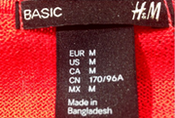  Hennes & Mauritz: social
responsibility in the supply chain Hennes & Mauritz: social
responsibility in the supply chain
On 15 September 2014, the Swedish clothing retailer signed an accord on social responsibility in the global supply chain with the International Labour Organization (ILO) in Geneva. As a specialized agency of the United Nations, the ILO is responsible for promoting social justice as well as human and labour rights. The agreement is the first ever of its kind concluded with the ILO. It is not only considered as exemplary, but also sets a new benchmark for the entire industry. Well-functioning labour relations are to be developed in a combined effort throughout the production chain. For example the Swedish trade union, IF Metall, is assisting H&M suppliers in Cambodia by their first implementation of regulated collective bargaining. The textile industry stands under intense scrutiny, following over 1,100 deaths as a result of the collapse of a factory building in Bangladesh in April 2013. Leadership was handed over to the ILO for the development of an internationally coordinated transformation plan for fire and building safety (see report in EWC News 3/2013).
Spanish construction groups sign global framework agreements
Agreement on occupational health and safety strengthens Africa
|
|
10.
Interesting websites
|
|
Global occupational health and safety
  New look for Country profiles New look for Country profilesThe new look for the Internet website of the European Foundation for the Improvement of Living and Working Conditions in Dublin has been on-line since 5 November 2014. It includes country profiles and labour relations of all 28 EU-member states as well as Norway which is updated every two years. In addition there are the former republics of Yugoslavia, which do not yet belong to the EU.
Dedicated website for European
Skills Councils
On-line training module for Corporate Social Responsibility
We have arranged many further interesting websites into a collection of links.
|
|
11.
New publications
|
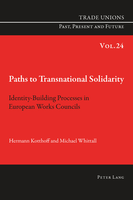  Empirical case study
on European works councils Empirical case study
on European works councils
A research paper was published in March 2014 which examines life inside the European works councils of five companies. The authors, who were sponsored by the Hans Böckler Foundation, have analyzed the key points which help in establishing identity and in promoting mutual co-operation. According to works council researcher Hermann Kotthoff, "the most important point is that the EWC should have dialogue with management on as many important topics as possible and also be taken seriously by them". The cases examined include the French pharmaceuticals group, Sanofi (see report in EWC News 2/2010) and Unilever, the consumer goods manufacturer (see report in EWC News 2/2014).
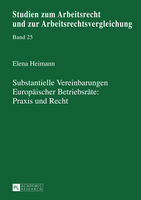  Legal stance of transnational
company agreements Legal stance of transnational
company agreementsA book was published in March 2014 which undertakes a legal classification of transnational agreements negotiated by European works councils on topics such as data security, profit-sharing, non-discrimination or on the consequences of restructuring. Since there are still no legal safeguards for such agreements, a large majority of the European Parliament requested a framework Directive on the subject in September 2013 (see report in EWC News 3/2013). It is still unclear whether the new European Commission will take up this initiative. There is substantial resistance from the employer side. The book is only available in German.
 A
seminar is being held from 23 to 26 March 2015 in Brussels and will
cover the role of European works councils in such cross-border company
agreements. A
seminar is being held from 23 to 26 March 2015 in Brussels and will
cover the role of European works councils in such cross-border company
agreements.
The Friedrich Ebert Foundation recently published two current country analyses on Scandinavia: in August 2014 on the "Swedish model" and in November 2014 on Norway. In both countries a decrease in the high levels of union membership is to be observed. While white-collar employees in Sweden remain faithful to trade unions, the level of unionization for blue-collar workers has sunk from almost 90% in the middle of the 90's to 68%. In contrast to the rest of Scandinavia, union membership in Norway amounts to only 52% but remains however relatively stable. Membership in Finland has also fallen below the 70% mark (see report in EWC News 1/2013).
Production chains and working conditions in computer manufacturing
We have gathered together further documentation into a collection of literature.
|
|
12. The EWC Academy:
Examples of our work
|
|
Fourth EWC conference in London 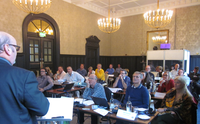  The
annual EWC Academy conference was held on 23 and 24 October 2014 in
London. Apart from current developments in labour legislation there
were also discussions on the consequences of a possible withdrawal of
the United Kingdom from the EU on European works council activities.
Professionals reported on information and consultation procedures on
the British level and EWC activities in the insurance company Axa
(see report
in EWC News 2/2014)
as well as the turbine manufacturer Rolls Royce. Apart from German and
English participants there were also three further countries present.
The next London conference, planned on 22 and 23 October 2015, will
cover the program of the new government, since in May 2015
parliamentary elections will take place. The
annual EWC Academy conference was held on 23 and 24 October 2014 in
London. Apart from current developments in labour legislation there
were also discussions on the consequences of a possible withdrawal of
the United Kingdom from the EU on European works council activities.
Professionals reported on information and consultation procedures on
the British level and EWC activities in the insurance company Axa
(see report
in EWC News 2/2014)
as well as the turbine manufacturer Rolls Royce. Apart from German and
English participants there were also three further countries present.
The next London conference, planned on 22 and 23 October 2015, will
cover the program of the new government, since in May 2015
parliamentary elections will take place.Seminars on labour legislation and EWC work in Manchester In 2015, the EWC Academy will further increase its seminar offering in the United Kingdom and has started co-operation with the Trade Union Education Unit at Manchester College. The training facility is highly specialized in workplace employee representation and was awarded a TUC prize for quality in 2012 (comparable to the German works council award). A seminar is being organized for the first time from 23 to 25 June 2015 on labour legislation and industrial relations. The British system will be presented in German; in parallel there will be a seminar for English-speaking participants on the German co-determination system. A further seminar is being held in Manchester from 2 to 4 September 2015 aimed at EWC members who wish to work more proactively in the future (in English, and on request German simultaneous interpretation).   Data-protection
in international companies Data-protection
in international companiesIn the former Hamburg dockside area, HafenCity, from 3 to 5 November 2014, discussions took place on the extent to which national and European works councils should be involved in the transnational processing of personal employee data. The seminar which was organized for the first time by the EWC Academy met with great interest and included 27 participants from Germany, Great Britain and France. Apart from a further seminar to be held from 28 to 30 October 2015 in Hamburg, the EWC Academy also offers expert counseling on the subject.   Swiss insurance - EWC plenary
meeting Swiss insurance - EWC plenary
meetingThe Zurich European Forum (ZEF), as their European works council is named, met from 10 to 12 November 2014 in the company training center in Zurich. Following a memorandum agreement between employee representatives and central management in May 2014 defining minimum standards for socially responsible restructuring and guidelines for severance plans (see report in EWC News 2/2014), the EWC Academy has now been commissioned to assist in providing opportunities to develop EWC activities and a structured flow for the consultation procedure. With 60,000 employees world-wide, the Zurich Insurance Group is the largest insurance group in Switzerland. Forthcoming event  A
member of the Zurich Insurance Group’s EWC steering committee
will present a report on their EWC work during the Hamburg conference
on 26 January 2015. A
member of the Zurich Insurance Group’s EWC steering committee
will present a report on their EWC work during the Hamburg conference
on 26 January 2015.  Improved consultation
procedure for U.S. Company Improved consultation
procedure for U.S. CompanyThe annual plenary session of the Avaya European works council was held from 8 to 11 December 2014 in Frankfurt. The company provides communication technology solutions for business customers and has subsidiaries in nearly all countries of the European Internal Market. The largest sites are to be found in Germany, Ireland and in the United Kingdom. Avaya has had a EWC in place since 2004 under German jurisdiction. Since the EWC agreement has not been modified since 2007, the U.S. company is therefore automatically subject to the new EU Directive. The representatives have now elected a new steering committee enlarged from three to five members. The new EWC chairman comes from Germany and the EWC Academy has been commissioned as the advisory firm. The plan is to develop a structured consultation procedure as a guideline for future restructuring. In 2011, the Avaya EWC had won, at the time, a particularly exceptional pan-European legal battle, following repeated difficulties with the time-off for British representatives (see report in EWC News 1/2011). |
|
13.
Current training schedule
|
|
  The
EWC Academy and its forerunner organization have been organizing and
delivering conferences and seminars for the members of European works
councils, SE works councils and Special Negotiating Bodies since
January 2009. So far 605 employee representatives from 228 companies
have taken part including many of them for several times. This
represents around 19% of all transnational works council bodies in
Europe. In addition there are numerous in-house events and guest
lectures given to other organizations. Following texts are
only
available in German: The
EWC Academy and its forerunner organization have been organizing and
delivering conferences and seminars for the members of European works
councils, SE works councils and Special Negotiating Bodies since
January 2009. So far 605 employee representatives from 228 companies
have taken part including many of them for several times. This
represents around 19% of all transnational works council bodies in
Europe. In addition there are numerous in-house events and guest
lectures given to other organizations. Following texts are
only
available in German:
7th Hamburg Conference for European and SE works councils   As every year in January, a
two-day conference is being organized in Hamburg. The topics: As every year in January, a
two-day conference is being organized in Hamburg. The topics:Monday, 26 January 2015: Current trends in the EWC landscape - new court decisions and examples of EWC activities Tuesday, 27 January 2015: Visits to a Vattenfall power station and discussion with EWC members   Seminar in Brussels Seminar in BrusselsA seminar is being held in Brussels from 23 to 26 March 2015 on the role that European works councils can play in the elaboration and development of transnational company agreements. The agenda also includes attendance to a meeting of the European Parliament’s employment and social affairs committee. EWC seminars in Montabaur Castle (also suitable for SE works council members)   Our
annual introductory seminar is being held from 7 to 10 April 2015 in
Montabaur (halfway between Frankfurt and Cologne). The following three
seminar topics are being run in parallel for beginners or for advanced
participants respectively (in German): Our
annual introductory seminar is being held from 7 to 10 April 2015 in
Montabaur (halfway between Frankfurt and Cologne). The following three
seminar topics are being run in parallel for beginners or for advanced
participants respectively (in German):
Additional seminar dates
Language courses: Business English for works council members
In-house events Please find a summary of possible topics for in-house events here: |
|
14. Imprint
|
|
EWC News is published by:
EWC Academy GmbH Rödingsmarkt
52, D-20459 Hamburg
Authors collaborating on this issue: Werner Altmeyer, Manfred Bobke, Rita da Luz, Reingard Zimmer Distributor of the German version: 20,270 readers Distributor of the English version: 3,403 readers Distributor of the French version: 3,209 readers
Newsletter archive: www.ewc-news.com
We are always pleased to receive comments and suggestions in relation to this newsletter as well as reports on your EWC activities. Please write us at: info@ewc-academy.eu
|
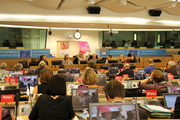



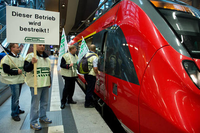





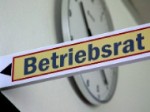


 The
first edition of an occupational health and safety newsletter was
published on 16 October 2014. It is edited by the International Trade
Union Confederation (ITUC) in Brussels, whose website has a section
with up-to-date news on the subject.
The
first edition of an occupational health and safety newsletter was
published on 16 October 2014. It is edited by the International Trade
Union Confederation (ITUC) in Brussels, whose website has a section
with up-to-date news on the subject.
